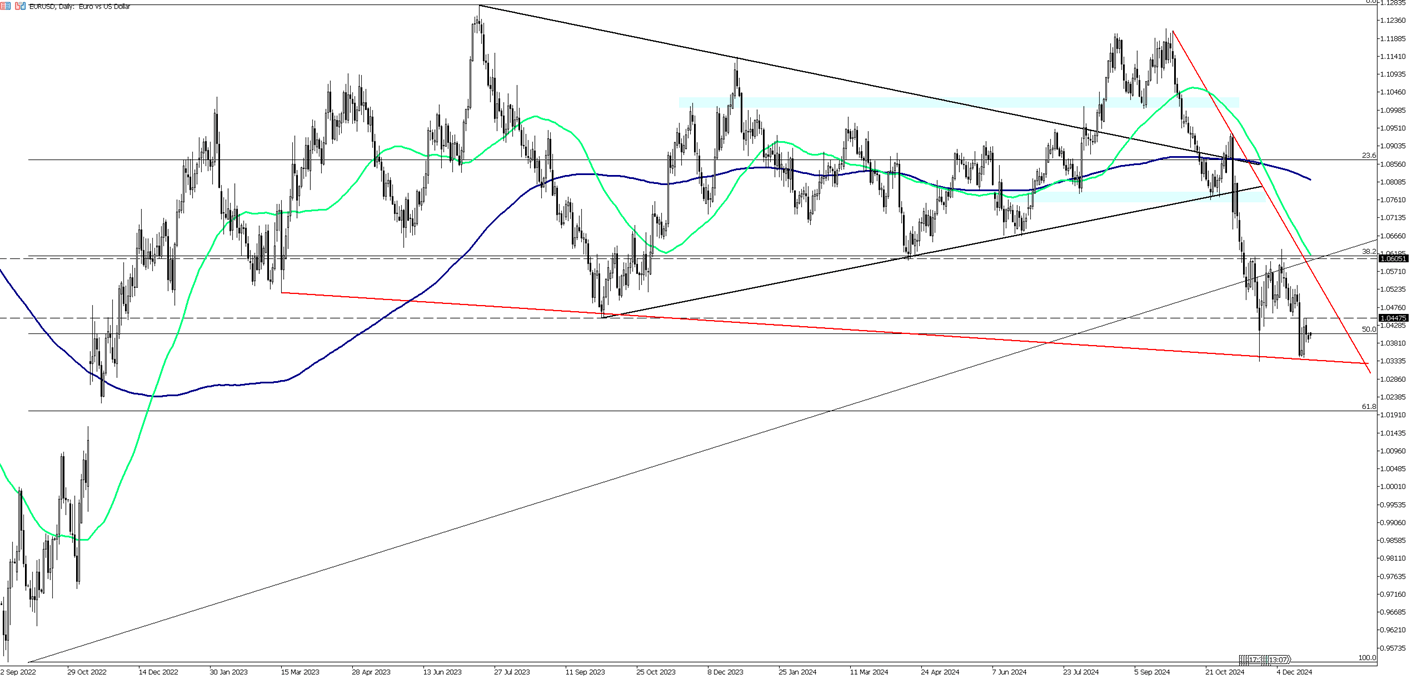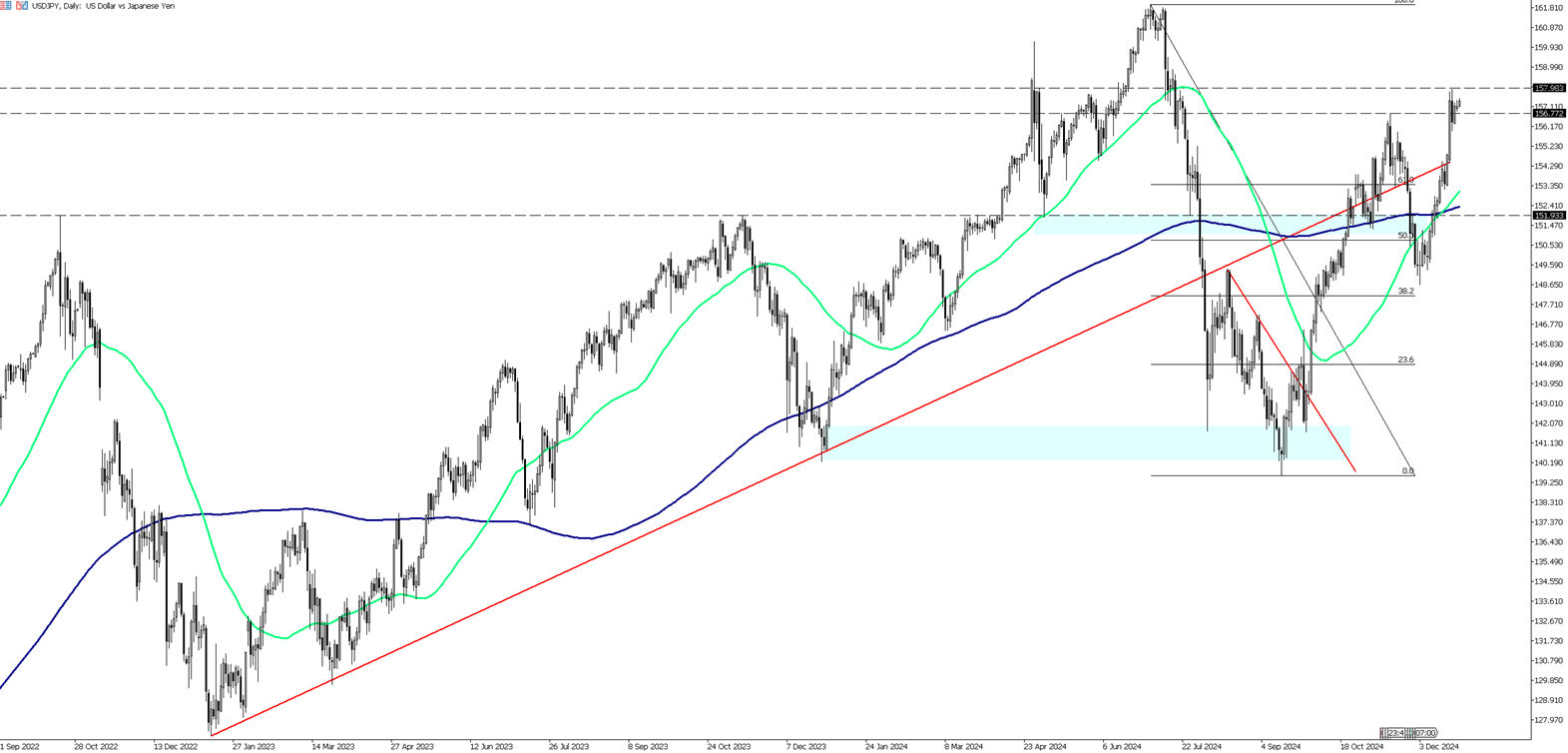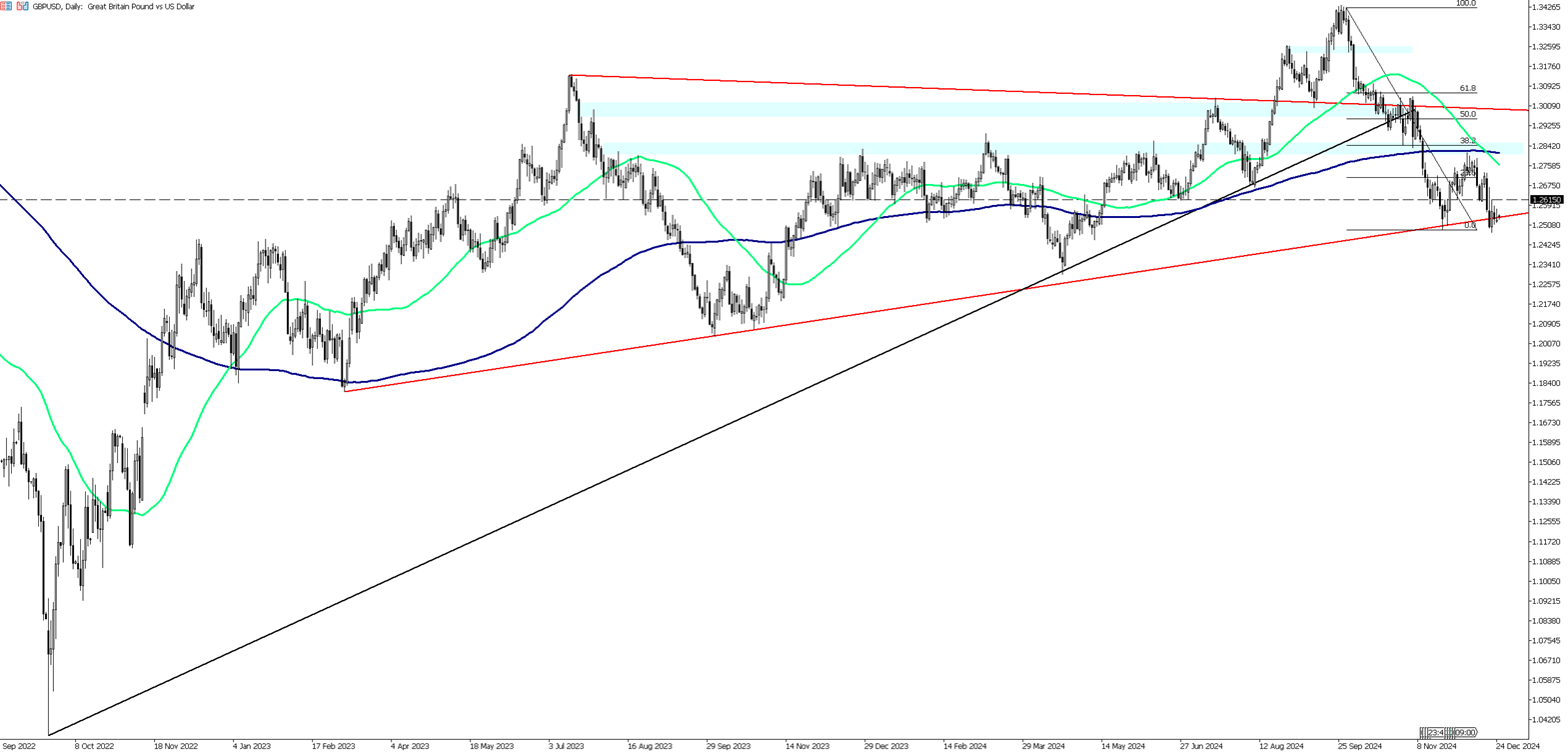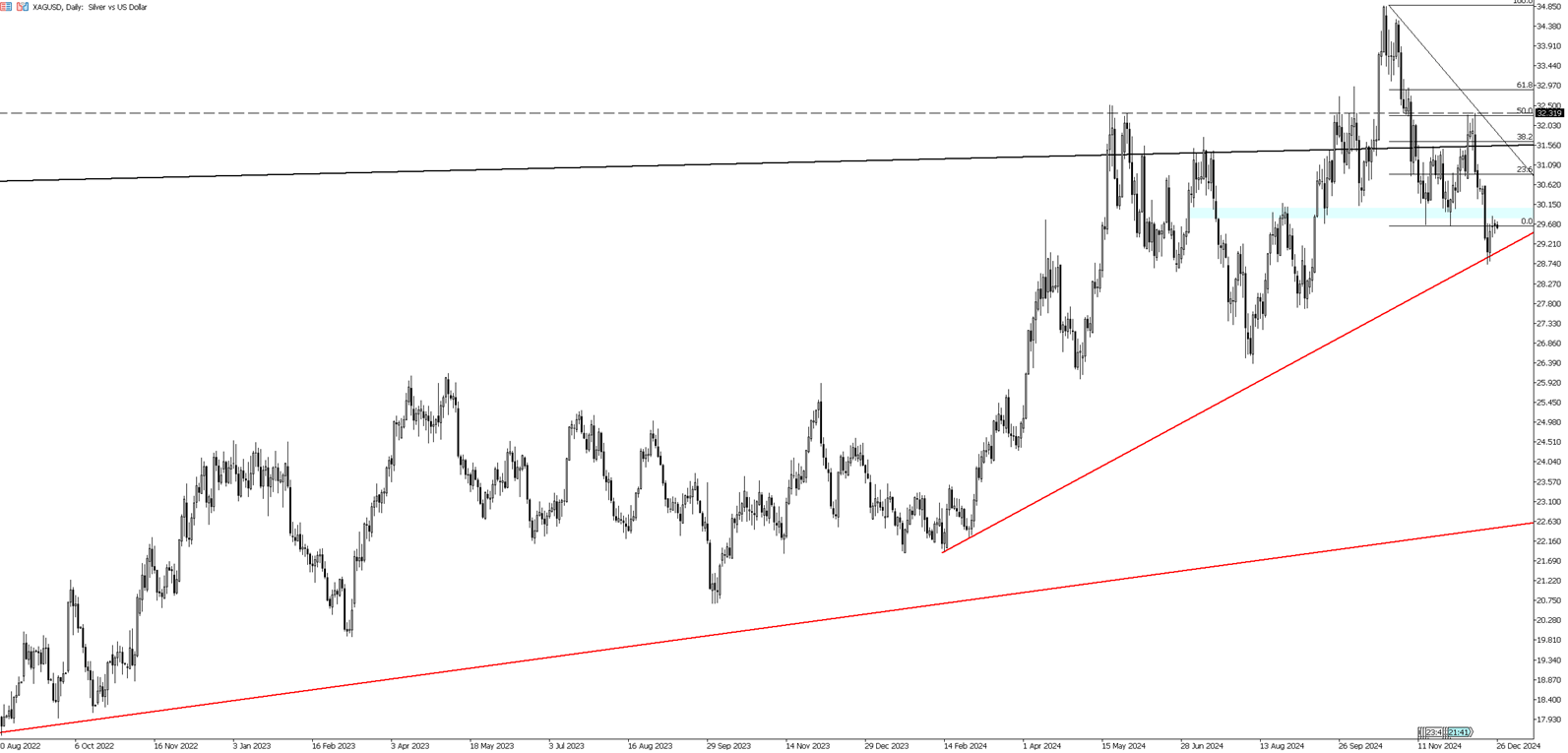Diverging central bank policies defined market movements in 2024, with the euro nearing a two-year low below $1.04, pressured by the ECB’s cautious stance and the dollar’s strength.
Gold surged to $2,610 per ounce, recording a 27% annual gain fueled by central bank purchases, geopolitical tensions, and easing monetary policies. The British pound weakened to $1.256 amid dovish BoE signals and stagnant UK economic growth. At the same time, silver recovered to $29.5, supported by lower bond yields but weighed down by weak industrial demand and China’s solar sector overcapacity.
| Time | Cur. | Event | Forecast | Previous |
| 13:30 | USD | Initial Jobless Claims | 223K | 220K |
| 15:00 | USD | 7-Year Note Auction | - | 4.183% |
| 21:30 | USD | API Weekly Crude Oil Stock | - | -4.700M |

EUR/USD remained range-bound during Tuesday's North American session, tracking the US Dollar (USD). The US Dollar Index (DXY) fluctuated narrowly above 108.00 amid low trading volume ahead of the holidays, with Forex markets closed for Christmas and Boxing Day on Wednesday and Thursday.
EUR/USD consolidated near 1.0400 on Thursday, maintaining a bearish outlook. The Euro (EUR) dipped slightly after ECB President Christine Lagarde told the Financial Times that inflation is "very close" to the 2% medium-term target but warned about persistent service sector inflation at 3.9%, despite overall Eurozone inflation easing to 2.2%
Lagarde also expressed concerns over potential trade tensions under US President-elect Donald Trump, cautioning against retaliatory tariffs, which she said harm the global economy.
Market expectations remain dovish for ECB policy in 2025, with traders anticipating four consecutive 25 basis point cuts to the Deposit Facility rate as inflation is expected to align with the ECB’s 2% target.
From a technical perspective, the first resistance level is at 1.0465, with further resistance levels at 1.0515 and 1.0575 if the price breaks above. On the downside, the initial support is at 1.0330, followed by additional support levels at 1.0300 and 1.0230.
| R1: 1.0465 | S1: 1.0330 |
| R2: 1.0515 | S2: 1.0300 |
| R3: 1.0575 | S3: 1.0230 |

The Japanese yen has paused its decline against the US dollar but remains near last week’s multi-month low. The BoJ's cautious stance on rate hikes and the Fed's hawkish outlook limit hopes of narrowing the US-Japan interest rate gap, while favorable risk sentiment weighs on the yen. Strong Japanese inflation data keeps a January or March BoJ rate hike possible. Geopolitical risks, including the Russia-Ukraine conflict and Middle East tensions, support the yen, while a weaker US dollar and potential Japanese intervention limit USD/JPY gains.
The key resistance level appears to be 158.30, with a break above it potentially targeting 160.00 and 161.00. On the downside, 153.90 is the first major support, followed by 152.70 and 151.00 if the price moves lower.
| R1: 158.30 | S1: 153.90 |
| R2: 160.00 | S2: 152.70 |
| R3: 161.00 | S3: 151.00 |

Gold traded above $2,620 per ounce on Thursday, with thin trading due to the holidays. Investors focused on the Federal Reserve’s monetary policy outlook and expected tariff policies under the incoming Trump administration, which may influence gold’s direction next year. While the Fed signaled fewer rate cuts for 2025, softer PCE inflation data raised hopes for more easing, increasing gold's appeal. Geopolitically, Hamas and Israel blamed each other on Wednesday for failing to secure a ceasefire, despite recent progress. Gold is set to end the year up 27%, its best performance since 2010, driven by central bank purchases, geopolitical tensions, and monetary easing.
Technically, the first resistance level will be 2635 level. In case of this level’s breach, next levels to watch would be 2670and 2710 consequently. On the downside 2605 will be the first support level. 2575 and 2545 are next levels to monitor if the first support level is breached.
| R1: 2635 | S1: 2605 |
| R2: 2670 | S2: 2575 |
| R3: 2710 | S3: 2545 |

The British pound traded at $1.256, down 1.3% against the dollar this year but still among the best-performing major currencies. A dovish Bank of England stance weighed on sterling, as the BoE held rates at 4.75% but saw a surprise split vote, with three members favoring cuts, signaling faster rate reductions in 2025. Despite wage growth accelerating and inflation rising to 2.6% in November, these pressures seem insufficient to delay easing. The UK economy showed strain, with GDP flat in Q3 and Q2 growth revised down to 0.4%, posing challenges for Prime Minister Keir Starmer’s government.
The first resistance level for the pair will be 1.2600. In case of this level's breach, the next levels to watch would be 1.2680 and 1.2750. On the downside 1.2475 will be the first support level. 1.2400 and 1.2350 are the next levels to monitor if the first support level is breached.
| R1: 1.2600 | S1: 1.2475 |
| R2: 1.2680 | S2: 1.2400 |
| R3: 1.2750 | S3: 1.2350 |

Silver climbed above $29.5 per ounce, rebounding from the three-month low of $29 on December 19th, as softer November core PCE prices eased fears of restrictive Fed policies, lowering bond yields and supporting precious metals. Despite this, silver underperformed gold due to weak industrial demand prospects. Overcapacity in China’s solar panel sector prompted a government-led supply regulation program, further dimming demand. The risk of yuan devaluation tied to China’s loose monetary policies also pressured silver by reducing export prices from the world’s top silver exporter.
Technically, the first resistance level will be 29.85 level. In case of this level’s breach, the next levels to watch would be 30.20 and 30.70 consequently. On the downside 28.75 will be the first support level. 28.00 and 27.00 are the next levels to monitor if the first support level is breached.
| R1: 29.85 | S1: 28.75 |
| R2: 30.20 | S2: 28.00 |
| R3: 30.70 | S3: 27.00 |
Russia-Ukraine peace efforts remain stalled.
Detail Trump Pressures Fed as Dollar Slips After Cut (12.11.2025)The Federal Reserve ended 2025 with a 25-bps cut to 3.50-3.75%, maintaining guidance for one cut in 2026.
Detail Fed Day Takes Shape, Chair Decision Nears (12.10.2025)Income strategies are under pressure as lower yields reduce the appeal of short-term Treasuries, pushing investors toward riskier segments such as high yield, emerging-market debt, private credit, and catastrophe bonds.
DetailThen Join Our Telegram Channel and Subscribe Our Trading Signals Newsletter for Free!
Join Us On Telegram!